Key takeaways:
- Pregnancy myths can create unnecessary anxiety; seeking accurate information and trusting healthcare providers is essential for expectant parents.
- Common pregnancy myths include misconceptions about exercise, diet, and the interpretation of cravings; understanding scientific facts helps alleviate stress.
- Building a supportive community, focusing on nutrition, and practicing self-care are vital for a positive pregnancy experience.
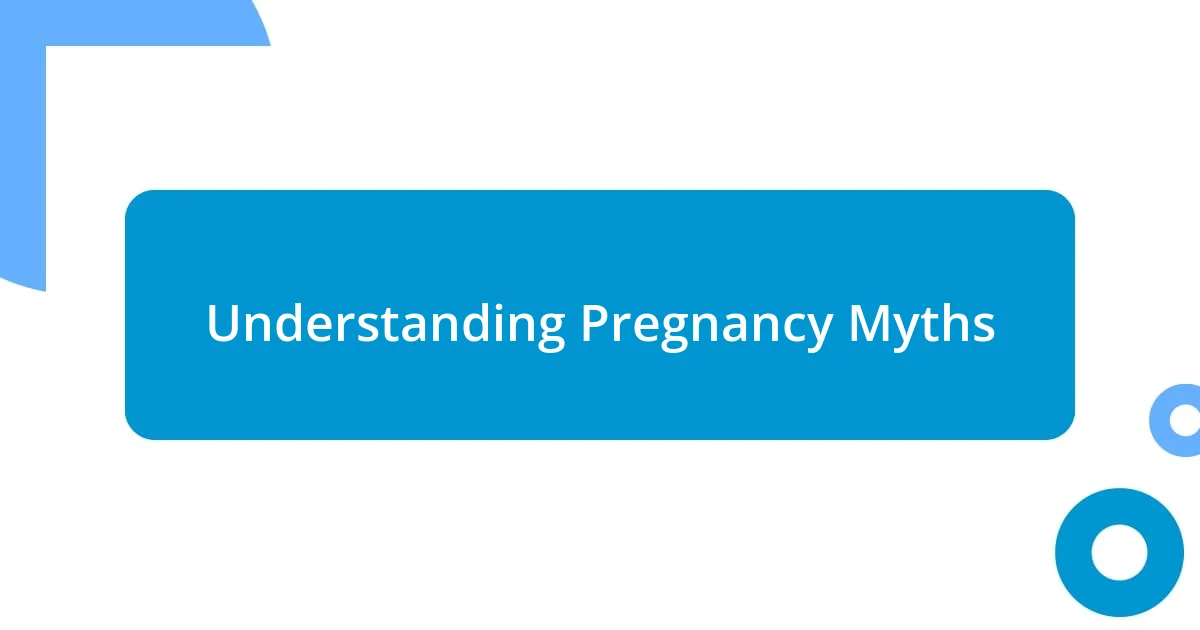
Understanding Pregnancy Myths
Pregnancy myths can often create confusion and anxiety for expectant parents. I remember when I was pregnant; I was bombarded with advice from well-meaning friends and family. It made me wonder: why do so many people feel the need to share their “wisdom” when most of it is more fiction than fact?
One of the most prevalent myths I encountered was that if you carry low, you’re having a boy, and if you carry high, it’s a girl. This led to a flurry of predictions and hopes, but it didn’t take long for me to realize these were simply old wives’ tales, lacking scientific backing. I found myself rolling my eyes whenever someone brought it up, thinking how lovely it would be to rely on facts rather than folklore.
As I delved deeper into understanding pregnancy myths, I found myself grappling with the emotional toll they can take. It’s unsettling to think about how easily misinformation can spread, making expectant mothers feel anxious about every little symptom. Have you ever felt that weight of unneeded worry? I know I did, and it sparked my desire to seek out accurate information and, ultimately, trust my instincts and my healthcare provider’s advice.
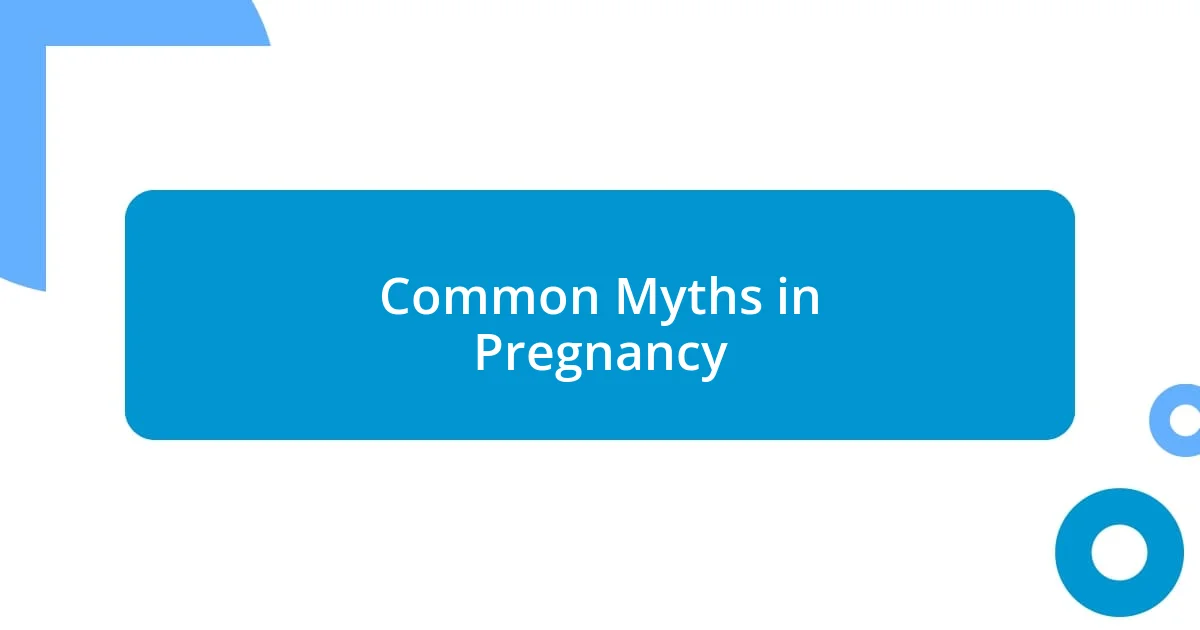
Common Myths in Pregnancy
I’m sure many people have experienced the flood of unsolicited advice during pregnancy, causing a mental checklist of what to believe and what to ignore. One common myth that startled me was the notion that you can’t exercise during pregnancy. I remember feeling relieved when my doctor assured me that staying active was not just safe but also beneficial. It was a game-changer to discover that gentle activities like walking or prenatal yoga could boost my mood and energy levels.
Here are some persistent myths that many expectant mothers encounter:
- Myth: You can’t eat fish while pregnant. While it’s crucial to avoid certain high-mercury fish, many types are safe and nutritious.
- Myth: Pregnant women should “eat for two.” Actually, the recommended increase in calories is modest, and maintaining a balanced diet is key.
- Myth: Heartburn means your baby will have a lot of hair. Although interesting, this has no scientific basis; it’s simply another tale that can spark speculation.
- Myth: Having a baby will ruin your body. Many women find incredible strength and resilience in their bodies post-pregnancy, often surprising themselves with what they can achieve.
In sharing these insights, I hope to empower expectant parents to sift through the noise and prioritize evidence-based information. Understanding what’s fact versus fiction can help alleviate some of the stress that comes with expecting a new addition to the family.
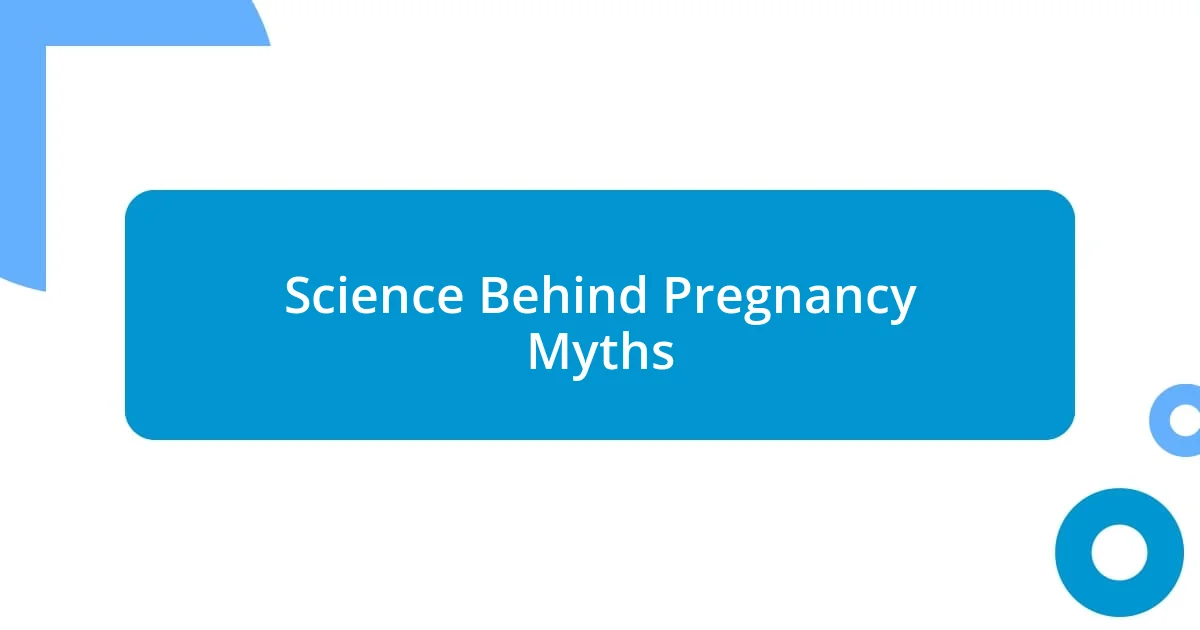
Science Behind Pregnancy Myths
When I began to explore the science behind pregnancy myths, I stumbled upon how our bodies react to significant hormonal changes. One prevalent myth is that cravings dictate the baby’s gender. I recall fervently wishing for pickles and ice cream, and when I shared that with friends, they eagerly speculated about a girl. However, research shows that cravings are simply a response to the body’s nutritional needs, not an indicator of the baby’s sex.
Another myth that struck me was the idea that all caffeine must be eliminated. Initially, this frightened me, as I adored my morning coffee ritual. Learning that moderate consumption is generally deemed safe helped ease my anxiety. Of course, it’s essential to consult with a healthcare provider, but understanding the facts allowed me to make informed choices without feeling deprived. My experience taught me that critically evaluating the myths helped me find balance during a time filled with overwhelming advice.
| Myth | Scientific Fact |
|---|---|
| Carrying low means a boy; carrying high means a girl. | Baby’s position is unrelated to sex; it’s based on individual anatomy. |
| Cravings indicate a baby’s gender. | Cravings are linked to nutritional needs, not gender predictions. |
| All caffeine must be eliminated. | Moderate caffeine intake is generally considered safe during pregnancy. |
| Pregnant women should restrict exercise. | Many forms of exercise are beneficial for mother and baby. |
As I learned more about the origins of these myths, it became clear how deeply culture and tradition influence our beliefs. For instance, the notion that heartburn indicates a hairy baby kept surfacing during my pregnancy journey. It made me chuckle, as it’s based purely on folklore rather than any solid evidence. I took comfort in acknowledging the light-heartedness of such myths, while also recognizing the importance of reliable information for my peace of mind.
It’s fascinating to observe how easily these myths can survive through generations, often passed down with little scrutiny. I found myself asking: why do these tales hold so much weight? From my experience, they can create unnecessary worry shifts our focus from what truly matters—our health and the baby’s well-being. When I focused on evidence, I felt more empowered and capable of embracing motherhood with excitement rather than anxiety.
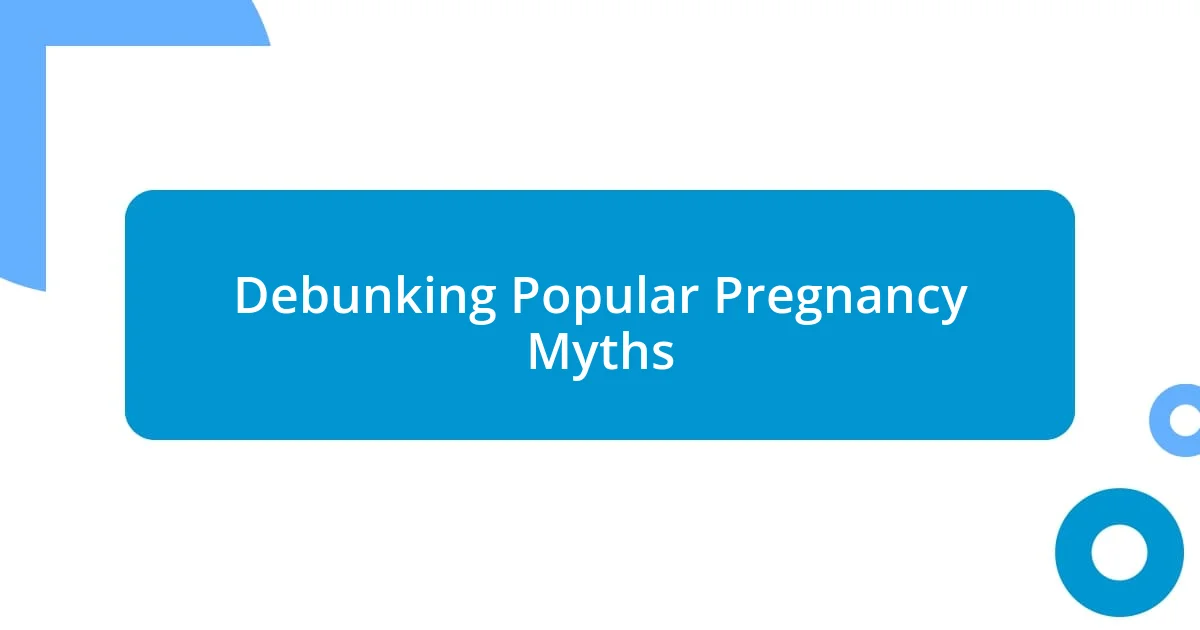
Debunking Popular Pregnancy Myths
One popular myth is the belief that a pregnant woman should avoid all forms of exercise. I remember being bombarded with advice warning me to stay put and rest. But after discussing it with my healthcare provider, I found out that staying active could actually enhance my overall well-being. It felt liberating to understand that walking, stretching, and even light weight training were not just acceptable, but beneficial. So, I often ask, why let fear dictate my choices when information could set me free?
Another persistent tale is that pregnant women must completely steer clear of all caffeine. For someone who cherished her morning brew, this was daunting. Learning that moderate consumption is generally considered safe was like a breath of fresh air. It allowed me to enjoy my coffee moments without guilt, reinforcing how important it is to separate myth from reality in our pregnancy journeys. Isn’t it amazing how a little knowledge can transform anxiety into reassurance?
Lastly, I came across the myth that carrying low indicates you’re having a boy. Initially, it was fun to engage in the speculation, but I soon realized it’s purely anecdotal, driven more by stories than science. Reflecting on my own experience, I realized that babies can take all sorts of positions regardless of gender. I found it comforting to know that I could let go of these whims—focusing instead on nurturing my health and my baby’s growth was far more fulfilling. After all, don’t we all deserve to embrace our pregnancies with clarity rather than confusion?
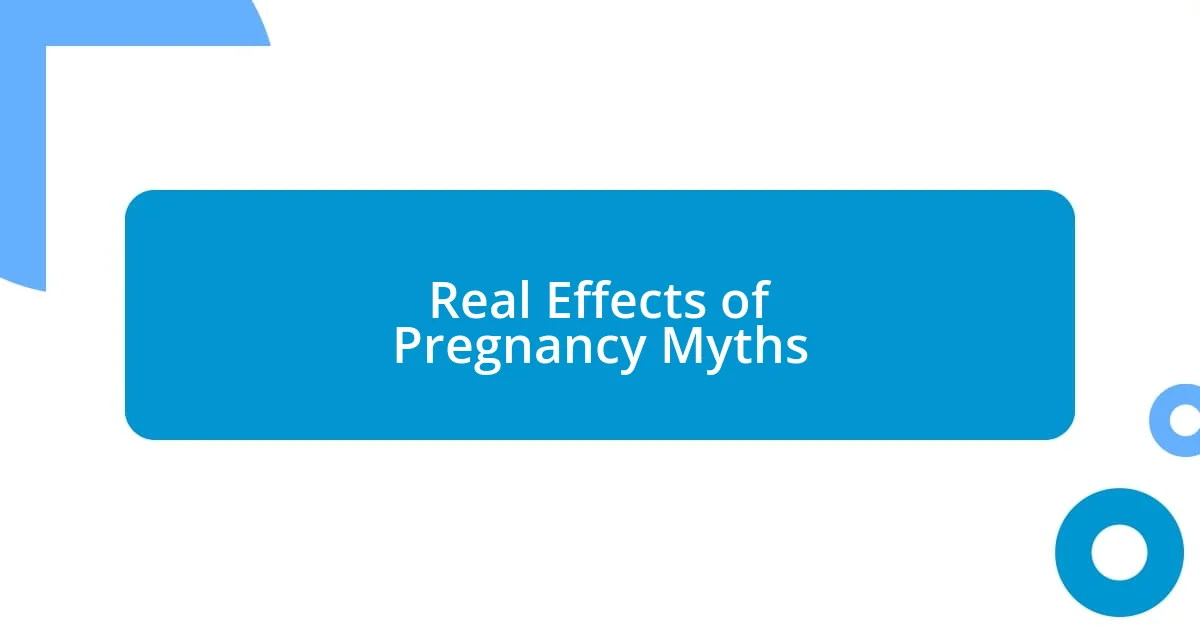
Real Effects of Pregnancy Myths
Pregnancy myths can have unexpected real effects on expectant mothers. One that struck me was the idea that heartburn during pregnancy meant a baby would have lots of hair. Initially, I found myself mildly worrying about my baby’s future hairstyle instead of focusing on the pregnancy itself. I realized this lighthearted myth could shift my attention away from genuine concerns, even though it was meant to be fun.
Another myth I encountered was the belief that pregnant women should avoid all forms of exercise. The first time I heard this, I felt an unsettling mix of confusion and guilt, especially because I loved staying active. However, once I spoke with my healthcare provider, I discovered that gentle exercise could actually be beneficial for both me and my baby. Why let fear cloud my judgment, I wondered, when evidence showed a different story?
Interestingly, I also learned how some myths can lead to unnecessary stress. For instance, the notion that cravings signify what the baby lacks nutritionally seemed so intuitive—but it created a mental tug-of-war in me. There I was, trying to justify my desire for chocolate while wondering what I was supposedly missing. It really opened my eyes to how integrating fact over fiction can empower us. How much lighter would our pregnancies feel if we let go of these pressures?
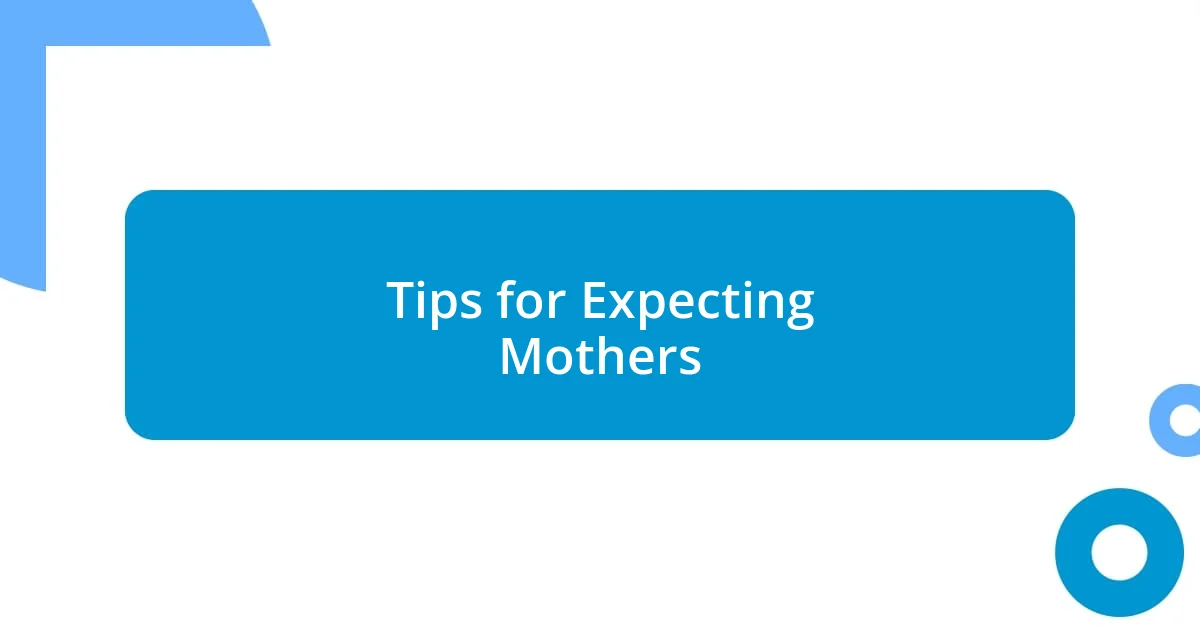
Tips for Expecting Mothers
One invaluable tip I found was to connect with a supportive community. When I was expecting, I joined a local mom group, and this made a world of difference. Sharing experiences, advice, and even a few laughs helped me navigate the ups and downs of pregnancy, reminding me that I wasn’t alone in this journey. Have you considered finding your tribe? It can transform those daunting moments into shared stories of joy and challenge.
Another thing that helped me was focusing on nutrition. I learned that it wasn’t just about eating for two; it was about making better food choices. Instead of indulging in every craving, I started preparing balanced meals rich in nutrients. Not only did it nourish my growing baby, but it also boosted my energy levels. How empowering it felt to know that the decisions I was making were impacting both our health!
Lastly, don’t underestimate the power of self-care. I remember taking a long, soothing bath after a long day; it was a simple act, yet it felt like a gift to myself. Finding time for relaxation and rejuvenation helped alleviate stress, which can be vital during pregnancy. What small rituals could you introduce to make your journey more enjoyable? Embracing these moments made all the difference for my mental well-being.
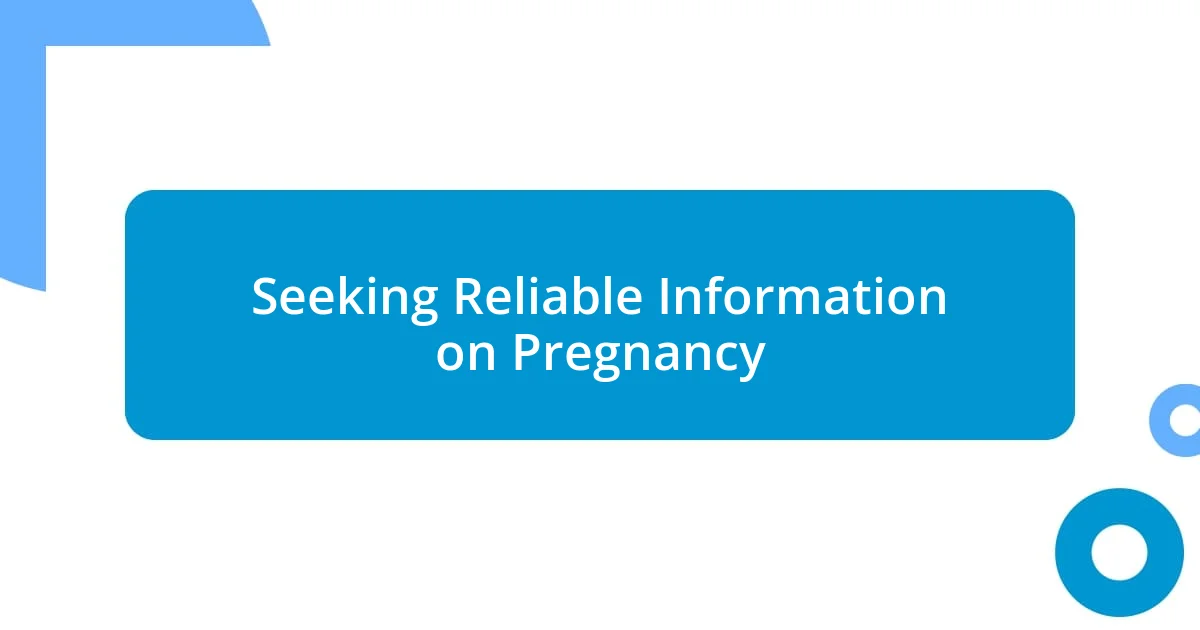
Seeking Reliable Information on Pregnancy
Finding reliable information during pregnancy can feel like searching for a needle in a haystack. I vividly remember the overwhelming sea of advice I encountered online, often conflicting and confusing. It was essential for me to filter out noise from trustworthy sources, such as my healthcare provider, reputable websites, and well-reviewed books. Have you ever found yourself lost in a web of misinformation? I certainly have, and it made me realize how crucial it is to prioritize accurate, science-based guidance as I navigated this life-changing journey.
During my pregnancy, I found that connecting with professionals was invaluable. I made it a point to ask questions during appointments and sought out childbirth education classes. I can still recall the relief I felt when one expert explained how each stage of pregnancy works. It put my mind at ease, transforming my worries into informed decisions. How empowering it is to turn uncertainty into knowledge, don’t you think?
Engaging with my community also played a significant role in my quest for reliable information. I frequently attended local workshops and meetups, where I listened to stories from seasoned mothers who had heard it all. I cherished the candidness of these discussions, particularly one heartwarming story of a mother who struggled with similar myths. It made me feel not just educated, but part of something bigger—a network of women committed to sharing their truths. If we actively seek out shared experiences, couldn’t we help dispel myths and support one another even better?














